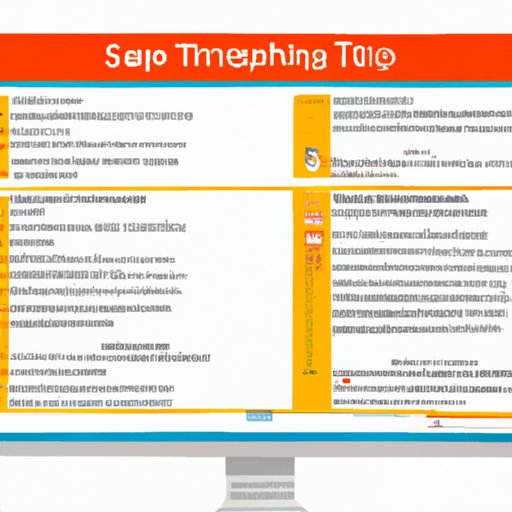Introduction
Have you ever wanted to capture an image of what’s on your computer screen? A screenshot is a quick and easy way to do just that, and it can be a useful tool for work, school, or personal use. In this article, we will provide a step-by-step guide on how to take a screenshot on your computer. We will cover a few different methods, including using the Print Screen key, Snipping Tool, and third-party applications. Additionally, we will offer tips for capturing difficult-to-photograph components and provide helpful resources for readers who need additional assistance.
Step-by-Step Instruction
Before we dive into the specifics, let’s define what a screenshot is and why someone might want to take one. A screenshot is an image of whatever is currently displayed on your computer screen. People take screenshots for various reasons, including capturing important information, troubleshooting computer problems, or sharing something interesting or funny. Here are a few methods for taking a screenshot:
1. Print Screen Key
For many people, the Print Screen key is the easiest way to capture a screenshot. Here’s how to do it:
- Make sure everything you want to screenshot is displayed on your screen.
- Press the Print Screen key (sometimes labeled “PrtScn” or “PrtSc”) located at the top of your keyboard.
- Open an image editing program such as Paint, Photoshop, or GIMP, and press “Ctrl + V” or select “Paste” to paste the screenshot into a new file.
- Save the screenshot as a PNG, GIF, or JPEG file.
Note: On some keyboards, you may need to press “Fn + Print Screen” to take a screenshot.
2. Snipping Tool
If you’re using Windows, Snipping Tool is a built-in program that allows you to take more precise screenshots. Here’s how to use it:
- Open the Snipping Tool program. You can find it by searching for “Snipping Tool” in the Start Menu.
- Click “New” to start a new snip.
- Select the type of snip you want to make. You can choose from Free-form Snip, Rectangular Snip, Window Snip, or Full-screen Snip.
- Use your mouse to draw a box around the area you want to capture.
- Save the snip as a PNG, GIF, or JPEG file.
3. Third-Party Applications
Finally, there are many third-party programs available for taking screenshots. These programs offer additional features such as built-in editing tools or the ability to capture screenshots of specific areas or windows. Here are a few popular options:
- Snagit
- Lightshot
- Greenshot
Many of these programs offer free and paid versions, and each has its own unique set of features. Be sure to do your research and choose the one that best suits your needs.
Tips/Tricks
Here are a few tips and tricks for capturing difficult-to-photograph components:
- To capture a screenshot of a game screen, use the Print Screen or Snipping Tool method and then paste the screenshot into an image editing program. This will create an image of the game screen without the additional graphics and windows.
- If you want to capture a screenshot of a long webpage or image, try using a scrolling screenshot program such as PicPick or FireShot. These programs allow you to capture an entire webpage or image by scrolling down and stitching together multiple screenshots into one seamless image.
- For Mac users, the keyboard shortcut for taking a screenshot is “Command + Shift + 3” for a full-screen screenshot or “Command + Shift + 4” to select a specific area.
Video Tutorial
If you’re a visual learner, check out this video tutorial that offers a step-by-step guide on how to take a screenshot using the Print Screen key, Snipping Tool, and third-party software:
Infographics
To further aid your screenshot process, here’s an infographic that displays all the necessary steps and techniques for taking a screenshot:

FAQ
Here are some common questions you may have about taking screenshots:
- Can I take a screenshot of my entire desktop?
- How do I take a screenshot of a single window?
- Where are my screenshots saved?
- I’m using a Mac; can I still take a screenshot?
- I’m having trouble taking a screenshot; what should I do?
Yes, you can use the Print Screen key or Snipping Tool full-screen snip option to capture your entire desktop.
Use the Alt + Print Screen key combination to capture a screenshot of the current active window.
Your screenshots will be saved to your computer’s clipboard or in the image editing program you have open.
Yes, Mac users can take a screenshot by using the keyboard shortcut “Command + Shift + 3” for a full-screen screenshot or “Command + Shift + 4” to select a specific area.
If you’re experiencing technical difficulties, try restarting your computer or updating your software. If the problem persists, consult online forums or support resources for your specific computer or software.
Comparison Chart
Use this chart to compare and contrast different screenshot techniques:
| Technique | Pros | Cons |
|---|---|---|
| Print Screen | Easy and quick | Can’t capture specific areas |
| Snipping Tool | Precise and customizable | Requires built-in program |
| Third-Party Software | Additional features | May require payment or installation |
Conclusion
Taking a screenshot is a simple yet useful tool that can be used for a variety of purposes. Whether you’re using the Print Screen key, Snipping Tool, or third-party software, there are several options for capturing the perfect screenshot. We hope this step-by-step guide has been helpful, and remember to choose the method that best suits your needs. If you encounter any issues or need additional support, be sure to consult the resources provided or seek help from online forums or support groups.
